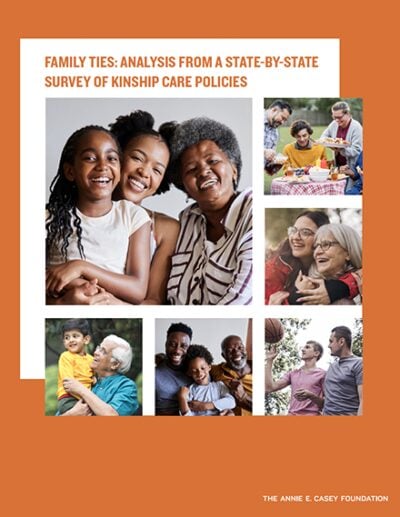Kinship Care on the Rise
From 2007 to 2021, kin placements for children and young people up to age 18 grew from 26% of foster care placements in 2007 to 35% in 2021, an increase of nearly 10 percentage points.

A comprehensive survey of kinship care policies identifies increasing efforts by states, the District of Columbia and Puerto Rico to promote kinship care and support kinship caregivers of children and youth who are known to the child welfare system. Read the policy data and analysis in a five-part series of briefs released throughout 2024. The survey, fielded in 2022, was conducted by Child Trends for the Annie E. Casey Foundation.
To help build an understanding of the full landscape of kinship policies across states and to identify needed improvements, the Foundation asked Child Trends to conduct a survey of state child welfare administrators. The survey updates and expands on the findings of a similarly comprehensive survey conducted in 2007. Agencies in the 50 states, the District of Columbia and Puerto Rico received the 2022 survey; 46 completed it.
The analysis shows states’ increasing reliance on placing children with relatives and an urgent need for improvement to address inequities in the assistance and services available to those caregivers. States are making exciting progress and investing in promoting supported placements with kinship caregivers. However, the analysis also shows that most financial assistance and services available for kinship caregivers are not based on need, but rather made available based on the caregiver placement type or category — licensed, unlicensed or informal/diverted. Caregivers who are able and willing to become licensed foster parents are most eligible for important resources. However, many kin who are willing — and who welcome the children placed in their homes by child welfare agencies — cannot meet the licensing requirements of their state or jurisdiction. In most states, they are not eligible for and do not receive types of financial assistance and support services that would benefit the children. Although many states have improved support for caregivers and reduced barriers to foster home licensing, more can be done. All children deserve the assistance, services and connections that ensure they will thrive, whether their caregiver is licensed or unlicensed.
In September 2023, the U.S. Administration for Children and Families released a new rule allowing child welfare agencies to simplify the approval process for relative foster parents and still access federal Title IV-E foster care funds. This change gives agencies the option of creating kin-specific standards that remove common barriers to foster home licensure for kinship caregivers. The rule also requires states to provide all licensed or approved kinship caregivers the same financial assistance they provide to non-relative foster parents.
Findings from the Foundation’s 2022 survey of child welfare agency administrators can help policymakers respond to these new opportunities, build on their states’ efforts to reduce barriers to licensing and increase support for kinship caregivers.
The 2022 survey offers a broad look at state policies on kinship caregiving across many stages of child welfare involvement.
The executive summary highlights the survey’s key findings. Data and analysis in the series will address:
Kinship care placements are increasingly common and make up a greater share of all foster care placements than they did just 15 years ago. Yet there are still tremendous inequities in financial and other support available to licensed kinship foster parents, unlicensed kinship foster parents and kinship caregivers of children who are not in the custody of the child welfare system.
This is a time of incredible change and opportunity in kinship caregiving policy. This survey’s comprehensive new findings yield important context about kinship care's strengths and weaknesses and highlight gaps in financial support and services. The 2022 survey sheds light on evidence of progress as well as persistent challenges and emerging opportunities to strengthen kinship caregiving. Understanding what states are doing can inform new policies and practices to ensure better support for kinship arrangements, build on the strengths of a child’s family ties and help keep families together.
We hope you'll find value in this report. We’d love to get a little information from you, which we'll use to notify you about relevant new resources.